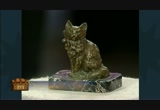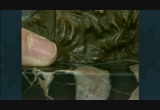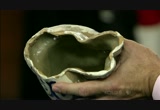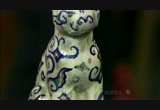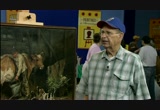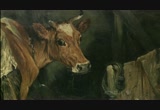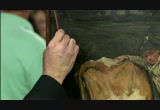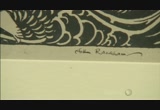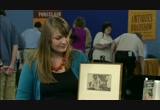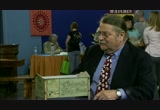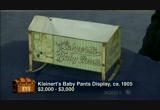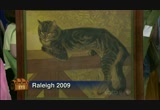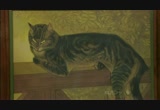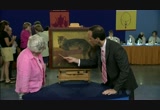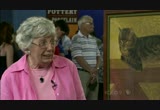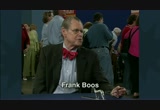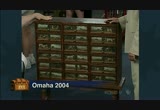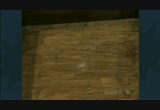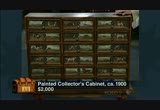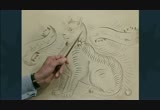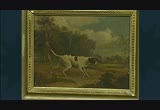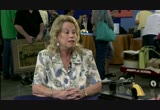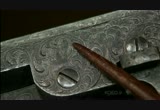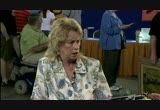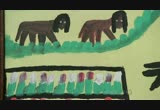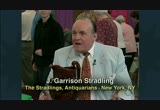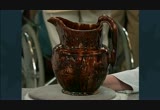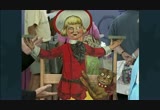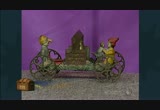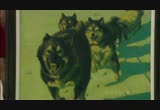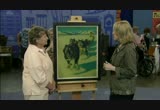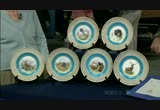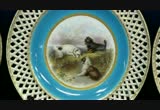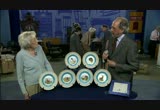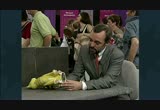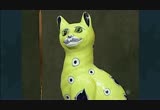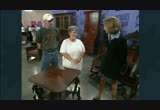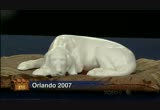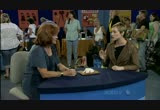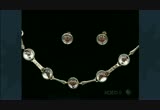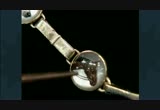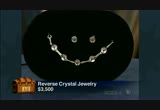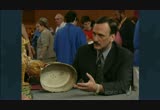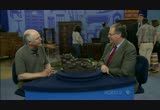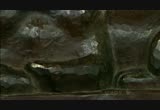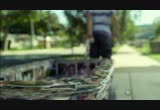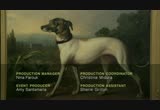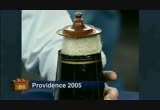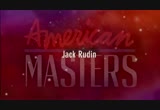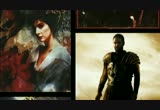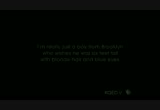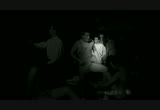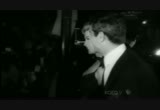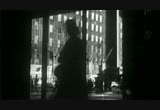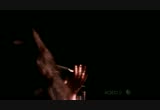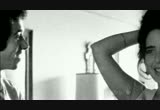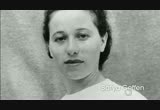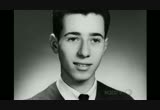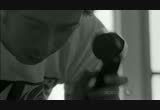tv Frontline PBS November 22, 2012 9:00pm-10:30pm PST
9:00 pm
captioning sponsored by subaru, liberty mutual insurance and viewers like you antiques roadshow possible. at subaru, versatility and safety drive all our vehicle designs. because however big, small, new or old your cargo may be, it's all precious. subaru, a proud sponsor of antiques roadshow. it's not about the things we have, but the memories we make with them. liberty mutual insurance. proud sponsor of "antiques roadshow." and by contributions to your pbs station from:
9:01 pm
welcome to antiques roadshow "cats and dogs." hi, i'm mark walberg. people have long honored their four-legged friends in arts and crafts. and we've put together a collection of appraisals we think is the cat's meow. so sit, stay... and stay tuned. woman: i got it in florida about 17 years ago. and i got it at an estate sale, but i don't know what i paid for it. i forgot. gary piattoni: can you guess? somewhere probably around five dollars. well, it's really charming, and it's a bronze. it's what they call an austrian cold-painted bronze. this cat also has a secret, doesn't it? that's right. the cat opens up, and it converts to a little naughty image here. right. and it's kind of, i would think, an early transformer. this was probably done around 1910.
9:02 pm
there was a very famous artist that made these. his name was bergman. and he did large-scale sculptures. but he always signed his small "naughty bronzes," "namgreb," which is "bergman" spelled backwards. oh. and he always signed his pieces. this piece does not have bergman's signature, so i have to assume it is a colleague or a contemporary of his. but it does have the austria mark on the back, which indicates that it is an austrian bronze, and again, probably dates circa 1900. so what you've got here is a lovely little naughty bronze, by day, kitty, and by night, a very risqué image. value on a piece like this, because they're highly collectible, is $2,000. oh, my goodness. isn't that fantastic? yes, it is. well, thank you very much for bringing it in. it's a lovely, lovely piece. thank you.
9:03 pm
my husband's great-aunt gave it to me, because i like blue. blue is my favorite color. and you've had it for how long? i would say around 20 years. well, this is a different kind of appraisal for me, because i'm not exactly sure what you've got here. okay. and this is going to entail a little bit of additional research. you saw me looking this over for a mark. there isn't a mark on this. i've been all over this thing, and there's no mark that i could find, which would have made life a lot easier for all of us. right. but what i saw initially, stylization. not only the colors that were used, but the way the colors are applied to this piece. let's show it in the round. the design is very unusual, and to my eye peculiar to shearwater pottery from ocean springs, mississippi, which started in 1928, and which was destroyed when katrina went through there a few years back. they're rebuilding it, but it's a very famous pottery, primarily run by walter and mac anderson, who did most of the decorating through the '30s and '40s and '50s. walter is recognized as an artistic genius.
9:04 pm
couldn't really socialize. he was left to himself to decorate and design. but this is what he did. the colors, the patterns. what also i notice, where the clay shows through, and then the clay color inside, looks to me like shearwater pottery. so i'm pretty sure that's what it is. and it's what we have to do when we don't have a mark. i did research. there's not an exact picture of this in any of the books that i found. and so we have to make certain educated guesses. so i'm guessing you've got a piece of shearwater pottery, shearwater cat. in terms of the decorative style, it's faience technique, background color laid down, and then decorative elements and darker colors starkly painted against it. if this is not shearwater, it's a nice ceramic cat, probably from the '40s or '50s, worth $300, $400, $500 at auction. okay. if it's a shearwater cat, at auction, i think it's worth between $6,000 and $9,000. whoa. it's a big difference, and it's a really good piece. if this is by walter anderson and somebody paid between $10,000 and $20,000 for it,
9:05 pm
i wouldn't be surprised. with a painting like this, can i assume that you're an animal lover? yes, i like cows. you like cows? and i like dogs. so did you buy it? i inherited it from my aunt. my aunt, i think, bought it back in the late '30s on a trip to england. and she lived a very long life, and at the age of 98, after she died, we were allowed to take one thing from their home. and i liked it, and so this is what i took. the artist is john emms, spelled e-m-m-s. and he's a victorian painter, born in 1843, and lives until 1912. this painting probably dates towards the end of his career. i would think this is dated in probably the 1890s or so. okay. it certainly is a mature work for him. you see the brushwork. his earlier work is a little tighter. this has much of the loose brushstroke that people really respond to. now, in the victorian era, he's a specialist in painting dogs.
9:06 pm
so this painting's a little different from him. we do have dogs, but we also have other elements here. we have a stable boy here, who had just finished milking a cow. and you see the bucket here. and what's happening is it's a little story being told here. it's an anecdotal painting, or a narrative painting. and what it is is these little beagles are here waiting for the milk, you know, from the cow. so the cow is turning around, a little surprised. and this is where he really revels in painting. he's known as one of the finest painters. part of it is brushstroke. and you see this beautiful brushstroke in the hair of these dogs, and how it follows the ears and the snouts. really one of england's finest painters of dogs. now, do you recall what your aunt might have paid for it at all? well, she's pretty shrewd. i would say, probably in the late '30s it would have been $1,000 or under. yeah. the '30s, $1,000, a fair amount. i think that's probably a good price then. that was expensive, yeah. did you have it appraised, or have you ever... no, i went to the library, my grandson and i,
9:07 pm
and we looked up in an english artists book, and they said that his paintings were going from, at that time, $2,000 to $5,000. well, this one is a good work. it's a good size. one thing you might want to do is you might want to consider a new frame. this frame is really inexpensive, and... it's really tacky. i didn't know if this was the original frame or what. so i was afraid to touch it. what you see all around the sides is some restoration of the frame rubbing. and that's where the original frame rubbed against the canvas. okay. and when they put the new frame on, that was exposed. and then they did the restoration on that. yeah, this is really ugly. i think an auction estimate would be about $15,000 to $25,000. okay. if i want to insure it, i go for what? you might go for more like the upper end of that range, maybe about $30,000. all righty, good. well, that's amazing. i really didn't think it was worth that.
9:08 pm
woman: i sort of found it by chance. i was shopping an online auction. i like to collect old books, and i love arthur rackham anything. and i came across this, and it said it was a signed print, and it had a "purchase now" price, and i jumped on it, and we think it's not a print; we think it's an original. laura crockett: how much did you pay for it? one hundred dollars. what started your love of arthur rackham? my mother and her mother before that, we have a lot of fairytale books, and he's done so many of them. and she taught me to love art, and she gave me a lot of his books when i was young. well, i love arthur rackham, too. and he is one of the most important british illustrators of children's books. and some of them are quite scary, like grimm's fairytales. beautiful illustrations, though. this is an ink illustration. over here in the left-hand corner you'll also see the "ar" monogram that he's developed into this drawing.
9:09 pm
and we find in the book the illustration for the chapter called "the birth of bran." and we see this woman with two wonderful greyhounds, all entwined in this very sinuous vine pattern here. very typical of the art nouveau period. but he was actually illustrating in the early '20s. i think this book was originally published in 1920. now, he did a lot of works with watercolor that were very detailed. and so it may not be as serious a work of art. however, it's a beautiful woman with dogs, and i would say at auction-- and i'm going to say conservatively-- that this would bring $4,000 to $6,000. wow. that's a good buy.
9:10 pm
woman: we were visiting my daughter, and she knows i like antiques, so she suggested we go to nevada city, take a little trip, and do some antiquing and have a nice breakfast. and i found this little cradle in an antiques shop. and i love the tin lithography, and also that it has a little dog on it. i'm a dog lover. uh-huh, uh-huh. the price was right, so i decided to buy it. well, what was the price? thirty-two dollars. and how long ago was this? a little over a year ago. wow. well, it is a cradle, and it's a lithograph tin. you have beautiful lithography. lithograph tin started coming into play in the very late part of the 19th and the early part of the 20th century. these are kleinert's waterproof baby pants. and of course it's an advertising piece. it's also a point-of-purchase display piece.
9:11 pm
that's what they call when they put something right near the cash register. and it would entice people to buy it. oh, okay. and i'm sure that they had the little baby pants here inside the cradle with a picture of the little baby in his waterproof pants to advertise the item. and it actually rocks. it's absolutely a charming thing. now, i've only heard of one other advertising piece for this company kleinert's. apparently this company, as i understand it, was founded in 1869 by isaac kleinert. and he was a major inventor who invented all sorts of things, from the shower curtains to shower caps, waterproof pants, to all sorts of rubberized materials for waterproofing. $32 i think was an extremely good buy. i'm sort of surprised you got it that recently at that kind of price. what would be, i think, a conservative estimate for auction purposes would be around $2,000 to $3,000.
9:12 pm
oh, my goodness. oh, my goodness! and frankly, i wouldn't be surprised if it could go for more. holy moly. and i just think... one of the things i love about the roadshow is when i see something i've never seen before. and i've been doing this now, the roadshow, for 14 years. i've been in the business for 40 years, never seen this, and it's a great piece. well, thank you. rosalie sayyah: you brought in a box of your mother's jewelry that she'd collected over the years. and how many pieces do you think was in that box? i'd say 100, maybe. about 100 pieces. and at the very bottom of it, i found this little guy. this is called a trembler, or the french term is "en tremblant." in the 1700s they did en tremblant pins that were flowers. they were worth thousands of dollars. this is from the late '30s and 1940s. it's pot metal, rhinestones,
9:13 pm
has two precious little scottie dogs, a very stylish lady with rhinestone embellishments. what do you think she might be worth? a good bottle of wine? that's a great idea. no, she's worth about $300 to $400. oh, my. yes. that is surprising. woman: i inherited it about 14 years ago from a cousin who had been in the women's army corps during world war ii. and she went to paris, and she bought this painting. she is a cat lover. and she paid a few hundred dollars for it. and she was told that it was extremely valuable. and this was in the 1940s? yes, mm-hmm. and i'm not a cat lover. so it's been on my porch for 15 years. and what do you know about it? i know that he was a contemporary of toulouse-lautrec, that he was swiss,
9:14 pm
and he came to paris in 1881, and he is more noted for his posters. the artist's name is théophile steinlen. and you're absolutely right. he was a contemporary and a friend of toulouse-lautrec's, also a famous poster artist. he was born in switzerland, and in his early 20s, he moved to paris. and he's first working in paris in the 1880s as an illustrator, and soon after that as a poster artist. he did a number of images of workers, and very much had a social agenda in imaging poor people, downtrodden people. but what he's best known for are his posters of parisian nightclubs and theater programs and, of course, the beloved cats. and most of his models are his own cats, so he didn't have to go far... i see. to find cats to draw. now, you said you thought it was a painting initially.
9:15 pm
it's actually a color lithograph. so it's a multiple; it's a print. he made this in an edition of several hundred in 1909. and it's actually a companion piece to another cat, which is an inside cat known as the winter cat. you have the summer cat. oh, okay. he's signed it in pencil right below the cat's front paws. up here is his monogram. and then right here you can see a blind stamp in the wood. oh! that's the publisher of this print, whose name was sagot. and it's actually turned on its side. it's sagot, paris. and he worked with the publisher sagot throughout his career in paris to issue these prints. you have one that's in very, very good condition. framewise, it's not good to have a print pushed up to a piece of glass like this. it would be much better off to have it taken out of this frame and put in a mat, so the print itself isn't directly touching the glass. i see. what you get here are some humidification marks--
9:16 pm
this faint, faint, light mark in the wood. and that's caused by the print over time pressing up to the glass. oh. in this condition, if i had to put a replacement value or a retail value on this, i would say it's around $10,000 to $12,000. so you're at the top end of the steinlen cat print market. i'm stunned. do you like cats any more after that? (laughing) i'm beginning to love it. great. i just can't believe it. i can't believe it. (laughing) woman: i brought you a russian wolfhound piece, or borzoi, as they call it now. frank boos: right. and you are aware of who made this, aren't you? i think it was fabergé. yes. this is the work of the very famous russian jeweler carl fabergé. we can see his signature down here.
9:17 pm
and we can see it also here on the top, as well as a little statement. and what does that say in translation? it's in russian, but it says, "from your grateful patient." "from your grateful patient." so it was somebody who gave it to his doctor. this silver dog would date approximately 1890 to about 1910. it probably was part of a desk set. this is in the form of a ruler. do you have any idea what it might be worth? no, i don't. when i go home to visit my parents, they usually give me something of value-- a piece of jewelry or something. and since i have a russian wolfhound and i collect dog paraphernalia, they gave me this as a present. but they didn't tell me how much it was worth. well, as this dog is by fabergé,
9:18 pm
i would feel in a well-advertised auction, we're probably talking somewhere in the neighborhood of $10,000 to $15,000. it was a nice present. it was a very nice present. yeah. woman: i worked for a lady, and i'd become very attached to her, and i always admired this chest. and she worked for the air force, and she lived in almost every country in the world. but she always told me she picked this up in france. anne igelbrink: in france? yeah. so when she died, her daughter gave me this piece. oh, that's so nice. so it's like a memento, something that you really liked. yes. as you can see, this piece is separate from the bench. i think you've just sort of put it on the bench. well, she had it on this bench. yes, so this originally would have been on a different type of stand. and this type of form was first made in the 17th century as, like, a collector's cabinet, where people would find
9:19 pm
interesting fossils, or shells and things. and they would build and paint, sometimes, cabinets to house these little objects that they found. and you've got this fantastic painting of all these different sort of hunting dogs. it looks like spaniels and setters. and when you open up the drawer, here... and if you want, you can pull out a drawer yourself and look on the side. you'll see that it's glued together. yes. and there are no dovetails. but when we turn it over on the inside, this is all stained. and there's a little joint here and here. that indicates it was made probably in the late 19th or early part of the 20th century, in an earlier style. okay. the interesting thing also, when you look at the front, see how this is all sort of carved and chipped away? that's to almost make it look like it's older than it really is. oh. it's walnut, and these little pulls are also typical for the 17th-century style. and then someone has taken something that was pretty plain, relatively mass produced,
9:20 pm
and they painted all these wonderful dog scenes on it. if this were just a plain walnut cabinet based on an earlier form, you'd probably be looking at maybe $200 in terms of an auction price. because it's got this painted subject with the dogs, this is something that could sell for easily $2,000 at auction in terms of value, and possibly even more. man: when i was about 16 years old, my great-aunt was visiting, and she said that since i was one of the few in the family that really liked old things, she was going to give those to me. she explained to me that they were gifts given to her by somebody that was dating her at the time. uh, did they ever marry? no, they didn't, nope. but she got to keep... she got to keep the paintings. these are calligraphic drawings that were done by professional drawing instructors who taught young ladies and schoolboys how to do this type of drawing
9:21 pm
that led into calligraphic writing and beautiful script. now, what's particularly interesting about these is most of the ones we see are deer and eagle. i've been talking with people on the floor. we have never seen a cat. really? and he's thoroughly delightful. this is what everybody would want in a calligraphic drawing. i mean, just look at the face, it's wonderful. and then on the other one, although we have an eagle, it's not a typical eagle. you don't usually see this wonderful little landscape vignette that's been included in it. so you have two of the most unusual drawings that i've ever seen, plus impeccable documentation. sometimes we may get the artist's name, but we don't have the person they were given to. i would say on the cat, if i were to insure it, somewhere between $3,500 and $4,000.
9:22 pm
and the eagle, probably around $2,500 to $3,000. oh, my. yeah. but i'm telling you, these are the best. wow. at the time, my mother was looking for a baby grand piano for my sister. she was learning how to play the piano. and it happened to be that a friend of the family had to clean out a lady's apartment who'd just passed away. so along with the piano came the painting. peter fairbanks: your painting is by francis calcraft turner. in the lower left is a signature. and it's dated 1835. this is a pointer. not the pointer that you'd find today, because they've been bred far differently since. but the british were very proud of their animals, and they, just around this time, started to do portraits of their best sheep or their bull
9:23 pm
or their dog or horse. and he was well known for this. one lovely aspect of it is over in the right-hand side, you have a nice landscape in the background. the painting has a label on its reverse, which is the label of arthur ackermann & sons, which was this famous sporting dealer. and they dealt with sporting pictures. and that's kind of wonderful to have that. this painting of this pointer has some condition issues. a colleague of mine didn't like the condition. doesn't bother me so much, because that cracking that you see, or hazing, i think is only in the varnish, and the varnish is on top of the painting. and i think when it's clean, that craquelure will disappear. it's a lovely picture which, with the cleaning first, i think probably would bring somewhere between $12,000 and $16,000. wow.
9:24 pm
rafael eledge: so what have you brought in for us today? woman: a gun that belonged to my great-great-grandfather. he owned a brewery here in san antonio in the menger hotel. and teddy roosevelt came to the hotel and drank. he was known to do that from time to time. and actually, that's also one of the hotels where they raised some of the soldiers for the rough riders. yes. that's what local lore is. yes, yes, the rough riders. across the top of the barrel we have the colt's patent mark and also the new york city production location. and what it is is a model 1851 colt's patent revolver. it's not made in 1851. that's just the model. they made these on up until 1873, which was still way before teddy roosevelt. if we turn the gun over, we have the serial number. it's 128,000. and thanks to mr. colt's bookkeepers, we know that that was made in 1862.
9:25 pm
oh, okay. so it was made during the heart of the civilar. what's special about it is that we have the letter e. yes. and that's very important for a colt firearm. that lets us know that it was to be engraved or embellished. this gun has beautiful scrollwork. yes. classic styling. i mean, it... wow. if you notice, there's a wolf's head. you can see the eye, the mouth. that's the sign of being engraved at the shop of gustav young, who was the premier engraver for colt firearms. he was like the picasso of gun working. oh, my god. to a colt guy, that sends chills up your arm. because it's not signed by him, it doesn't have his name on it, we can't say that he's the one that engraved it. we know that it's in his style and is going to be one that came out of his shop. shop. this gun would have been a high-quality gun, so it could have been a presentation piece or a gift.
9:26 pm
it's not one that you would actually carry into service, usually, unless you were a flamboyant person. it has the original ivory grips that have a beautiful golden tone, just rich, thick patina. it's a beautiful gun. have you ever had the gun appraised? yes, my father did many years ago, and they said it was maybe worth around $1,000. a gun like this, you would need to insure it between $12,000 and $15,000. (in a whisper): oh, my god. (barely audible): $12,000 to $15,000... that's a lot of money. and i've been keeping it wrapped up in an old cloth. it's just unbelievable. it is unbelievable. good news? yes, very good news. woman: well, i inherited this painting from my paternal aunt, and she and her husband would travel down from new york city to natchitoches, louisiana, to visit his family.
9:27 pm
and they just loved these paintings by clementine hunter, is what i'm told is how she pronounced her name. and i too have always loved them. she was known as the grandma moses of the south. this is great, you've got the blackbirds, you've got the goose pulling on the little girl's dress there. yes, and the dogs, my aunt june always... we loved the way she made those old dogs look. even with the market the way it's been, one that size with subject matter that interesting and that colorful would probably, retail, be about $6,000. really? wow, that's great. that's great. cool! woman: it belonged to a dear friend of the family. she was from kentucky, and it came to me through my aunt and my father. and i've had it approximately seven or eight years.
9:28 pm
i liked the fact that it had a dog for a handle, and it has, well, it seems to be a hunting scene on it, interesting eagle on the bottom. did you know it was american? no, i didn't. well, you liked the hound handle. yes. well, the hound handle-- and, as a matter of fact, the shape in general-- devolves from an english form which was done by a company named phillips and baxter in england in the 1820s. and then it was... came over here, and the d&j henderson company of jersey city featured it in this form a hound-handled pitcher, in the american institute exhibition of 1828 or '29-- in that time period. the same kind of a hound handle was copied, they said, from classical designs and was found at herculaneum, of all places. the design around the sides here is a fox hunt.
9:29 pm
very hard to see because of the glaze. now, the glaze is what we call a rockingham glaze. well, a rockingham glaze is basically a clear glaze which has been stained or colored with manganese to make it look brown. and it was introduced into this country about 1844, '45. so we can date this pitcher in that particular period. now, the shape itself began, as i said, in jersey city. it was carried by a modeler by the name of daniel greatbatch to bennington, vermont, where they did the same form of pitcher. and then it went to where this pitcher was made. it was made in cincinnati, ohio. this is cincinnati in the 1840s. now, the mark on it is an eagle. now, the eagle has been filled in with brown glaze, so you can't really read what's underneath that eagle. but it says "bromley, cincinnati". oh, my goodness.
9:30 pm
and the value of this is between, i would say, $2,000 to $3,000, probably around $2,800 realistically, something like that. what do you think of that? fabulous. (both laughing) did i tell you too much about it? no! (both laugh) woman: it's been in my family since about 1919. my father asked the buster brown company if they would send him a sign. it used to have prices of the shoes on it. male appraiser: little placards, right. but he knew that with the arms outstretched like this, it would be perfect for displaying the helium balloons that he sold weekends. in 1878, george brown had an idea to start mass-producing shoes and selling them. in and around 1902, it was richard felton outcault
9:31 pm
that came out with the buster brown comic strip with his dog, tige. now, two years later, they all get together. we've got george brown and outcault coming together to give us buster brown and tige as one of the most recognizable icons for shoes in the world. and from that point on, buster brown shoes have become part of the american iconic history as far as shoes, utilitarian items, but also in advertising. this is an early piece. you can see the face here, the way that the eyes pop out. i would definitely agree that this is from in and around the 1919 time period, which makes this very early. it's lithograph on tin plate that has been die-cut. everything is original. it's an incredible piece as far as advertising collectibles go, and if i were to estimate this at auction, i would estimate it in and around the $5,000 to $7,000 price range. oh, my lord.
9:32 pm
but for insurance purposes, easily a $10,000 piece because to try and replace this piece would be very difficult because of the incredible condition that you've kept this in. well, i was just hoping that it was worth more than the $35 it took to ship it down. (laughing) woman: well, my aunt and my mother started collecting antiques probably in the '40s, and this is just one of the toys that was handed down to me. what you have here is a toy made by gong bell manufacturing company out of east hamden, connecticut. it's a nursery rhyme toy, and the reason it's called a bell toy is because it had a bell action. as you moved it, the bell rings. this one is called "ding dong bell, pussy's not in the well" off a nursery rhyme which is written right in here. very good condition, original polychrome paint, all cast iron.
9:33 pm
this toy today, on an open market, is worth $3,500 to $4,500. you're kidding. no. i had no idea. that's great, thank you. that much money, that's amazing. woman: it's from alaska, and the artist is fred machetanz. i was in anchorage, alaska, and i walked into an art dealer, and i saw this on the wall. i just looked at it and fell in love with it and it just said, "buy me," so i did. well, fred machetanz was born in 1908 in ohio. he studied in the midwest. and then in 1935, he intended to make a brief visit to his uncle in alaska, but he ended up staying for two years. okay. so he obviously liked the place. and then he served in the aleutian islands in the navy during the war and came back to live in alaska in 1946.
9:34 pm
he married sara dunn, and she was a writer, and they would work together on books and films and lecture series about alaska. and he is really known as a colorist, which you can definitely see in this picture. this is a great alaska subject, and he would depict frontier life and native animals and these beautiful arctic landscapes. he was quite a good artist and had quite a bit of recognition in his lifetime. one of his big influences was another american artist named maxfield parrish, and they had a similar technique, which was to use an underglaze-- in the case of this, it was an ultramarine blue-- and then they used very thin oil glazes to build up the surface and give this kind of luminous glow to the picture. now, how much did you say you had to pay for this? uh, $500. well, his market has
9:35 pm
definitely increased since you bought it. it's signed and dated down here, and you bought it right around the time it was painted in 1963. and i think if this were to sell in a retail gallery today, it might be for about $25,000. really? yeah. that's wonderful. woman: my husband bought them in england-- in london, as a matter of fact. male appraiser: when was that? 1944. here you brought today the receipt when he bought these plates, and i love to have old documentation on things like that. yes. and i see here there's a description. it says "6 china plates, pierced rim, white with gold turquoise band, landseer subjects." and he paid a little over £31. we can see that they're all entirely hand-painted. this is really high quality hand-painted work. three of them have dogs, which is a very desirable subject. uh-huh.
9:36 pm
and two of them have stags, or bucks, which is also a good subject, and then one here is like a pastoral scene with a wagon and horses. yes, that's my favorite. let's look at the back here and see what the marks say. they say thomas goode & co., minton, and then there's the address in london where the thomas goode store was located. but as you may know, when these plates were bought by your husband, they were antique at the time, so to speak. oh. they were actually made in the 1870s. oh, my. and sold when they were new by thomas goode and then they entered the marketplace, were owned by some family, and then thomas goode bought them back and resold them again in 1944, which is really interesting that they owned them twice. also on the bottom is a blue-painted pattern number and then another red mark with the number of the plate. now, these plates were from a whole series done by minton, and all these plates were after paintings
9:37 pm
by sir edward landseer. oh, that's interesting. landseer died in 1873, and during his lifetime, he was a really famous and prominent british painter of especially dogs and game-type subjects. and they were licensed to copy his paintings on plates. now, one of the plates, i understand, got broken. yes. i put it in a plate hanger, and it was bumped and chipped, and they told me in the states that they didn't have the right gold to repair it, so when we went to england on our 50th wedding anniversary, i took it back to thomas goode & co. and they repaired it. and they did an excellent job. the repair is across here on the top, but it's really hard to see, so it's a really well done repair. i understand that you had to pay £120 to have that one repaired, which was a lot more than you paid for the whole set in the first place. yes, it was worth it. well, these plates are really desirable in today's marketplace. a retail price is usually between $1,000 and $1,500 each
9:38 pm
oh my. for the ones in perfect condition, and occasionally in certain circumstances it might be a bit more. okay. so you've got five perfect plates. for the set of five in perfect condition, the total would be between $5,000 and $7,500. plus you have one additional plate that's damaged and restored well, and that plate would probably be about an additional $500. all right. so you've got a really valuable set here. yes, that's wonderful to hear. well, thanks for bringing it in. it's a great set; we loved seeing it today. thank you. woman: this cat has been in my family probably since the early '50s. and my grandmother, since my childhood, has always said that it would be mine because i loved it as a little kid and i drew pictures of it. so when my grandmother passed away recently, the cat was left to me. male appraiser: well, let me tell you a little about your cat. i'm going to turn him over,
9:39 pm
and we can see the name of the maker, e. gallé, which is for émile gallé. now, émile gallé is known as one of the founders of the french art nouveau movement, and he's mostly known as a maker of glass. but he also made furniture, and he grew up in a family of potters. and in his early career in the 1880s and 1890s, he made pottery, especially this type of pottery. you can see the white color of this glaze. it's made white by adding tin, which oxidizes and goes white over the pottery base. we call this faience, or tin-glazed earthenware. it's very traditional to the french provinces. gallé was working in the french provinces, in nancy, when he made this faience cat. and he made a wide range of faience, but he particularly liked these cats. and they have been reproduced more recently, so we look carefully at them to see if they're new ones or old ones.
9:40 pm
but this is an old one, and in many ways, the best way to tell if it's an old one is simply by looking at the face. your cat has what i like to call the cheshire cat grin. yeah, it does. and it's almost impossible to replicate that particular kind of mischievousness that gallé put into the grin. he does have that look. it's also beautifully made, beautifully colored, and very characteristic of a gallé cat, probably made in the 1890s. today, these are quite valuable. i don't know if you've ever had an appraisal done of him, or... no, i've tried to find out a little bit about him and i went on the internet, but i could only find out about the glass, there wasn't anything about pottery. well, this one today at an auction would probably bring about $2,000. wow. because it's in such great condition, it may even bring $2,500 or $3,000. wow! the table looks to be probably made in about 1880s,
9:41 pm
and the cabinet maker who carved these legs here was really having fun. yes, he was. and if you look closely, the dog is just chasing the squirrel right up the tree. it's really cute. we would probably say at auction it would be worth between $5,000 and $8,000. okay, that's wonderful. a friend of my dad's, he belonged to an archeological club affiliated with the university of utah about 35 years ago. this gentleman was a millionaire, and him and my dad became good friends and liked my dad and gave him one of two dogs that he had. male appraiser: so do you have any idea what this is? i've seen pictures similar to this in books of mayan... you think it's mayan? i think it might be mayan. okay. this piece is supposed to come actually from west mexico, in the province of colima,
9:42 pm
and what we look for in a colima dog is a wide open mouth like this, real sharp ears, the striations are great, curly tail and fat body. all of that's highly desirable. unfortunately, what they did with this one is they incorporated it all into what is a contemporary piece. this was made for sale. and the striations normally are on a dog that's sitting on its haunches. stylistically, it's a little aberrant, and it doesn't come together like an authentic dog. the most telling sign is the fact that it was fired in an electric kiln. when you tap on this thing like this, it has a very high pitch, which means it wasn't fired in a primitive kiln. so therefore, we know that this piece is not authentic. mm-hmm. they sell this sort of thing on the decorative market all the time for $150 to $200.
9:43 pm
so how did you come out on it? oh, it cost nothing, so... so you're $200 ahead of the game. $200 ahead. if this thing were authentic, a dog like this now would be $4,000 to $6,000. woman: this is a dog that was on my grandmother's mantel. i remember it being there all my life. and my grandmother passed away. my mother moved into her house and it stayed on the mantel, minus the pillow. and when my mom passed away, we cleared the house out and that dog just stayed on the mantel, nobody took it. so i was cleaning the house, ready for the realtor, and took the little dog. looked for the pillow, i finally found the pillow in my mom's desk. so i reunited it, and it's been on my mantel. i don't know anything other than i know it's by roseville, because it's got a label.
9:44 pm
it has a label, and i'll show you the label right here. it's underneath, and it's a 1930s label. it's nice to see this little dog again. i've met it once before. okay. this is part of roseville's ivory line. and we see many different lines of roseville here at the roadshow-- usually 1940s floral lines, that's what we see the most often. so it's nice to see anything that is done before that. and it is extremely rare that we see any figurines at all. a few years back, we held an auction of only roseville pieces, and one of the very last lots had this dog. and it brought $1,500. it's pretty stunning, as most of the roseville items are now in the low hundreds. and something that is from the '30s that doesn't look like so much would be worth so much and would be such a collectible-- probably because it's a dog, also because it's roseville,
9:45 pm
so it has this cross-action of different types of collectors here. so i'm so glad you brought it. well, thank you. woman: when i was a teenager, i was involved in riding hunters and jumpers. and the hunter and jumper people collected these. and so my father, for my 16th birthday, bought me one, and at that time they came uncut. you just... you bought the crystal and then you had it set in whatever setting you wanted. over a period of two-and-a-half years, between '46 and '48, my father bought me the five that are in the bracelet. probably 15 years ago or so, my sister-in-law, who had the earrings, she sold those to me. okay. this is called sporting motif jewelry. it's a reverse crystal bracelet. and the technique is really interesting. the jeweler actually takes a piece of rock crystal that's been rounded and smoothed out
9:46 pm
and he carves it from behind. he carves out the exact image and then it's painted from behind as well. at that point, it's backed with mother of pearl. so you can see a little bit of the shine behind the actual crystal-- that is mother of pearl. and then it's joined together with a stirrup strap and this snaffle bit, which is a really great motif. so it's all in keeping with the actual piece. we've got a hound dog, we've got a horse, a fox and completed with the other two at the end as well. when we go to appraise these, we always take a look at the quality of the carving and how well it's done and executed. the detail on the dog and the little whiskers are really crisp. i can tell you've taken really good care of it. it's in really good condition. reverse crystal can get scratched easily. and then we have the matching pair of earrings, too. the are very popular in the sporting jewelry world. as far as i know, they're not making too much of it today. now, as far as value, do you have any idea?
9:47 pm
no. i know that at the time they were bought, the unset crystals cost $50. okay, all right. and then you had to have them set. well, i was speaking with my colleagues and if this were in a retail arena, the bracelet with the matching pair of earrings set in 14 carat yellow gold would retail right around $3,500 in today's market. thank you. yeah! that's really wonderful. man: i inherited these from a very dear friend who was an animal lover. he had inherited them from a very dear friend who was an animal lover. so now they sit at home on my sideboard, and i continue to be an animal lover. i know that originally they were brought to missouri in the 1950s from either vermont or maine, and i'd always been told they were from the american rockingham factory. these spaniels are mid-19th century, around 1850.
9:48 pm
they are probably british. really? the glaze on them is absolutely wonderful. it is a rockingham-style glaze. the flint enamel work along there, also called treacle glaze. the holes in the bottom are for vents. they have to have some way to release the heat from the inside of the dog when it's in the kiln. this type of base is more typical of a scottish base than an american base. the other thing i have to show you is that i've also found... oh, i'll be darned. ... virtually the same spaniel figures as the ones we have now. i've only seen the english type, generally the white with the gold on them. i've never seen these. here's a set of staffordshire-style spaniels that are not white, that are a great, rockingham-type glaze that's absolutely in wonderful, wonderful condition. one of the things that is unusual about them, the size is 16, 17 inches high,
9:49 pm
and typically the spaniels that you see are shorter. if these were to come up to auction today, you probably would have an estimate of $2,000 to $3,000. ah. man: i got it from my sister, and she got it from a friend of hers about five or six years ago. it was sitting on her mantel and she just decided she didn't want it anymore, and i have cats at home, and i have a cat picture on the wall, so it was natural for her to give it to me. so you know who the artist is, a fairly well-known artist. i do. tell me what you found out about mr. zorach. i looked on the internet. he was an abstract painter, it looks like, in the first part of the last century, and then he started doing carvings, and cats were one of his things that he liked to do. that's right. he was born in lithuania and came here as a child. he studied in new york, he studied in paris, and he did start as a painter, an abstract painter.
9:50 pm
in fact, he exhibited at this famous armory show of 1913. he became well known as a sculptor, and this is a great example of his carving. it's signed here on the back, "zorach," and i like that really bold, bold signature there. oh, i do too. yeah, that's great. i think he was really proud of this wonderful, wonderful cat. i mean, it's amazing how he captures his personality. the personality is what i really liked about it. it's very, very heavy, as you know. yes. pretty sure it's made out of mahogany. it's tough to carve, so this is a great testament to his carving abilities. and i don't know if you noticed, but this is made out of two pieces of wood. no, i didn't notice that! you see right over here? yeah, i thought it was a crack or something like that. no, because it goes all the way around. oh! the wood was not quite high enough, so typically, artists would glue together two pieces and then carve it. wow. i think this was carved probably in the 1920s or '30s. okay. he did a lot of sculptures.
9:51 pm
he liked these cats. most of his work was done in bronze. the carved wood ones are much rarer. and that's what's so great about this is its surface, the way it's carved, the sort of faceting, and it gives it a life, it gives vitality to the piece. yeah, yeah. i would think at auction, this is probably in the $25,000 to $35,000 range. that's quite a bit. yeah. and i think it's toward the higher end of that. really? because the size is very good, and the personality that he's been able to capture in this cat is just so wonderful. yeah, i had no idea. a cliché, but i... that's amazing, it really is. no bones about it, these treasures have some animal magnetism. don't go away. in a minute, an 18th-century racing dog comes up a winner again. antiques roadshow possible.
9:52 pm
at subaru, versatility and safety drive all our vehicle designs. because however big, small, new or old your cargo may be, it's all precious. subaru, a proud sponsor of antiques roadshow. it's not about the things we have, but the memories we make with them. liberty mutual insurance. proud sponsor of "antiques roadshow." and by contributions to your pbs station from: captain's head, which was a farm in scotland. she came down through my grandfather's side through my mother. there is a reference to her, 1789, in a manuscript. her name was bottoms, which i believe meant "stamina" in old english--
9:53 pm
i'm not 100% certain on that. she never lost a race. um, other than that, and the fact that she's against an italian background, i believe, that's all i know about her. it is a wonderful portrait, and as i'm sure you know, british art history has a great tradition of portraits, and that came to include their animals as well-- their dogs, their horses and other livestock. unfortunately, the piece is not signed, but i would date it to around 1830. and it's in the tradition of the great animal artists such as george stubbs, and continuing through artists such as gilpin. i don't believe the frame is original to the piece. i suspect that it would have been in a much more elegant frame than this later 19th-century frame. in terms of the value of the piece, even though it's unsigned, i think it's a great example of english animal portraiture and i would estimate it at auction between $12,000 and $18,000. good heavens, unbelievable. she's come up a winner again.
9:54 pm
yes, she has indeed. bless her heart. i'm mark walberg, thanks for watching. we'll see you next time on antiques roadshow. man: this was given to me by my mother, who received it from her mother. when you pull it out... there it goes. and you'll see the cat comes up and then disappears. i'm amazed at the condition that it's in. it's by one of the foremost toy producers of the 19th century, ives, a connecticut-based firm, and they made this toy around 1885. i sold one years ago, and it brought over $8,000. are you kidding me? no, i'm not. so when i saw it come into the roadshow, i was very pleased. so the kitten in the can is a great toy,
9:55 pm
and thank you for bringing it to the roadshow. well, thank you, so it's worth about $8,000, huh? wow. my wife's going to want to sell this. here it comes. and then it will come up. there it goes. announcer: available now from shop pbs... woman: male, adult. must have been in there a couple of weeks. buried with some ceremony. this is incredible. the dagger and the flame. is that a clue? lewis: i want facts, i want evidence. get it sorted, robbie, now. announcer: to order, visit shop pbs, or you can download on itunes. one tremendous thing about pbs is that it makes art accessible by putting it on a platform where
9:56 pm
millions of people can access it for free. and we need it. we need music, we need dance, we need great theater for our soul, for joy in our lives. a lot of people flip on pbs and hear or see something that wakes up that integral part of being a human being which is enjoying the arts of other human beings. so i'm grateful for pbs as an artist and as a viewer.
10:00 pm
and by the corporation for public broadcasting. additional funding for "american masters" provided by... and the following... additional support for this program provided by the ziff family. and by contributions to your pbs station from viewers like you. for whatever reasons, through whatever circumstance, through whatever he has gone through, that we are each a figment of our own imagination. and some people have a greater ability to imagine than others. [ "carry on" by crosby, stills, nash and young playing ]
10:01 pm
♪ one morning i woke up ♪ ♪ and i knew you were really gone ♪ ♪ a new day, a new way ♪ and new eyes to see the dawn ♪ man: david defined these cultures -- the music culture, a show biz culture, the motion picture culture. he defined it, he built it. he shifted the shape and nature and methodology of the modern record business. he's our patron, you know. the medici -- medici of rock and roll. ♪ the sky is clearing ♪ and the night has gone out ♪ geffen: now, i don't think people get to be successful without ambition. and i don't think people get to be successful unless they have very strong egos.
10:02 pm
but i don't see either of those words, either "ambition" or "ego," as pejorative words. man: there isn't anybody who's had the kind of career that he has had, that crosses so many parts of arts and entertainment. he sees opportunities to put people together and do things that other people didn't see. that's why he's david geffen. and we're not. man: if he wanted something, he was gonna get it. nothing and no one was gonna stop him. one way or another, he would outsmart you, out-talk you, or out-yell you. his dog bites, and it doesn't always growl first. david comes right at ya. okay? you know, when you get to a certain point in your life and everybody's afraid to tell you the truth. david is never afraid. man: david geffen in three words -- "constantly, ruthlessly, honest." very giftedly non-diplomatic. "balls." one word.
10:03 pm
passionate. funny. and neurotic. can i have four? geffen: the thing about brooklyn i remember the most is how much i wanted to get out of brooklyn and move to california, where the sunshine was constant, where everybody was pretty and good looking and... uh... i left the day i graduated high school. ♪ ♪ if you're in doubt about angels being real ♪ my image of california was a movie image of california. there were beaches and surf, everybody was rich, big houses, big cars.
10:04 pm
i was sleeping on a couch in my brother's apartment, and one day this guy walked over to me and said, "would you like to be in a movie?" and i said, "yeah!" and i was an extra in "explosive generation." i actually haven't seen it since it came out, but i know that i'm in there somewhere. wait till i tell larry, i bet it's him she's talking about. hey, maybe it's me! oh, sure it's you! geffen: i didn't really have an idea of what hollywood really was. it was just the place where they made movies, and, you know, i was a child of the movies. there were two theaters in my neighborhood in brooklyn, had a double feature change every week and i went to both of them. that was my favorite time of every week. ethel merman: ♪ there's no business like show business ♪ geffen: i loved musicals, i loved dramas, i loved... i particularly loved movies about show business. it was thrilling. i remember going to see "singin' in the rain" because i was so captivated by the movie that i wanted to see it over and over again.
10:05 pm
and of course, it was on a double feature, so in order to get to "singin' in the rain" again, i had to see the other feature again, and i had stayed in the theater so long that my mother was terrified -- i hadn't come home, i never stayed away that long, and she called the police, and eventually i got home to a panicked family. you know, "where were you?" "watching 'singin' in the rain'." ♪ there's no people... i never thought that i would have a career in show business. i couldn't imagine how i would get one. man: that's not what you do if you're a nice jewish boy from brooklyn. you know, you own your own store. you take over your father's business and you do better. show business -- it doesn't happen to guys from brooklyn. geffen: my dream was to make a thousand dollars a week, have a cadillac convertible and an apartment on ocean parkway. i would've thought that was nirvana. in los angeles, i must have had a dozen jobs, and i got fired from all of them. but i was very fortunate in that i had become friendly with the casting director, and i told her i really wanted to work in the entertainment business. and she said to me, "well, do you have an education?"
10:06 pm
i said, "no." "do you have any gift in this area," you know. i said, "no, i'm -- i'm completely without gift." she said, "you should become an agent." i had never heard that before, i'd never heard the word "agent" before. uh, so i said, "well, what does an agent have to know?" and she said, "nothing. you can be an agent and know absolutely nothing." so i thought, oh, that's the job for me. i went back to new york, and i went to apply for a job in the mailroom at the william morris agency. i thought, i'm not going to get the job if i tell the truth, so i said i graduated from ucla, and that i'd worked as a production assistant on "the danny kaye show." they hired me the very next day. as i was delivering my mail and going into the offices of all these people, i'd listen to them on the phone and i thought, hmm, they [bleep] on the phone. i can [bleep] on the phone. i mean, it was the first time in my life that i thought, i can do that. i was happy as i could possibly be. but then the guy who was showing me
10:07 pm
what i should do in the mailroom every day, got fired. so i said, "well, what did you do?" he said, "i lied on my application. i said i graduated from ccny." so i turned blue, because i said i graduated from ucla. so i came in early every day for the next six months, we go through all the mail to find the letter saying they'd never heard of me. which meant that i had to sort all of the mail before anybody came in. so of course, i wasn't that popular in the mailroom, because i made everybody look bad. i finally got the letter, and i steamed it open and replaced it with a letter saying that i graduated from ucla. and that's how i started my career at william morris. man: when i got there, david was already a legendary figure. there was a specific training role of who was in the business, and you learned who the players were and how to -- how to deal with them. but the one thing they didn't tell you was the inter-office politics, which normally you needed years to learn. but david had an accelerated way of learning it, which was to read everyone's memos.
10:08 pm
i used to be able to read memos upside down, so that i could see what was on the desk of all the agents whose offices i went in to deliver mail. it was like going to the college of the entertainment business. now, i wanted to be in the movie business, uh, and the guy who ran the music department was a guy named jerry brandt, and he said to me, "you think norman jewison is gonna sign with you? how old are you?" he said, "if i were you, i'd get into the music business. mick jagger is your age, and i have mick jagger," he said, "and guess what?" he said, "everybody returns my phone calls." so, i started going out every night looking for talent. man: his energy and persistence -- he was desperate to succeed. i stepped on a lot of toes at that time, and probably didn't handle things as diplomatically as i should've. leider: it was all-consuming. and i didn't get a sense that david had any other life but being in the talent game as an agent.
10:09 pm
♪ love is but a song we sing geffen: when i signed jesse colin young and the youngbloods, i didn't really know anything about what it was to make a record deal, so i had asked what the biggest deal anybody had ever heard of was, and then i tried to make a deal for him ♪ or make the angels cry and i made his record deal at rca, which had that very famous song, ♪ c'mon, people now, smile on your brother ♪ ♪ everybody, get together ♪ gonna love one another right now ♪ ♪ c'mon, people now, smile on your brother ♪ ♪ everybody, get together ♪ try to love one another right now ♪ i have today ordered to vietnam the air mobile division and certain other forces which will raise our fighting strength from 75,000 to 125,000 men. geffen: i got notice for the draft. and i thought, here i am, in the greatest job i've ever had, and i'm gonna have to go into the army and potentially go to vietnam.
10:10 pm
and i was talking to an actor client of one of the agents, and i told him how frightened i was about getting drafted, and i didn't wanna leave william morris, it was a big deal for me to be there. and he said, "well, just tell them that you're gay." i said, "tell them i'm gay?" i said "seriously?" there were no role models. there were no other people i knew who were dealing with the same issues that i was dealing with. i had no idea if this was a stage i was going through or not. but i go to the draft board in brooklyn, and i fill out the form, and there was a question that said, "do you have homosexual tendencies?" and i check "yes." but wherever i was on line i'd see people i went to high school with, and i was afraid of anyone knowing this about me, so i kept on falling back in line and falling back in line. if you said you had homosexual tendencies, they sent you to a psychiatrist. he said, "i see here that you've checked the box." and i said, "yep." he said, "so, you think you'd have a problem serving in the armed forces?" i said, "well, you know, so many men."
10:11 pm
and, uh, i was out of the service. ♪ last call ♪ for the poverty train [ piano plays ] ♪ yeah geffen: when i first heard laura nyro, i was completely intrigued by her. ♪ it looks good and dirty she was a strange and unusual girl. she wore black nail polish and dark purple lipstick. very unlike the folk era artists of that period of time. ♪ you got yourself a trip, you can see ♪ her music was very different than anything that i'd ever heard before, and i loved everything that she was saying in that music. ♪ become god, become cripple ♪ become funky nyro: i don't think you start off planning
10:12 pm
to write a personal song. i just -- these feelings, going through something emotional, and unable to know what it is. and then, uh, one night i just sit down, and there's a song there that's coming from inside me. ♪ baby, i just saw the devil ♪ and he's smiling at me geffen: i thought she was the greatest artist on the planet, and i totally believed that i could bring her to the world. so, i signed her to the william morris agency and became her agent. ♪ nyro: ♪ eli's coming man: nobody thought laura would become an important artist. david jumped in there and fought for her constantly, and took care of her like no agent i was exposed to. ♪ eli's comin', hide your heart girl ♪ ♪ eli's comin'
10:13 pm
geffen: part of getting laura nyro's career going was setting up a music publishing company for her. her favorite food was tuna fish, so she ended up calling it tuna fish music. and we became partners in this new publishing company. and then, when we talked about where she wanted to make a record deal, i said, "look, the best artists in the world are on columbia records," and she said she wanted to be on the same label where bob dylan was. man: as a singer/songwriter, she was very, very special. and so we made our first arrangement and did our first deal. man: here we go on six. nyro: stanley, could you turn up my voice a little, please? man: yeah, hang on one second. man: take six. ♪ davis: david facilitated all of her quirks and all of her wishes being fulfilled. nyro: ♪ can you surry, can you picnic? ♪ ♪ whoa if laura was going over budget david would justify it,
10:14 pm
and ask the company for continuing showing of support. and we're talking about an unknown artist, someone who had not broken through at that time. i don't understand how he moved the columbia machine. 'cause i had already been there a year and a half, and i couldn't move it. everything was exactly the way she wanted it. she wanted, for instance, her -- the song lyrics of her album to smell like lilacs. and, the lp of "eli and the 13th confession" had a lilac-infused ink used, so that when you read the lyrics, it smelled like lilacs. i mean, anything she wanted, i wanted to get for her. man: he idolized her, he put her on a pedestal, he took care of her, he nurtured her, he loved her. ♪ he's a runner and he'll run away ♪
10:15 pm
♪ soon there'll be no man geffen: when we were looking for a manager for laura, she said to me, "why don't you manage me?" and eventually i thought, do i really believe she could be one of the biggest stars in the world? should i give up my career, at this point in my life, where i'm doing so well, and put all my marbles in laura's basket? and i woke up one morning and i thought, if you really believe it, go for it. i think everybody thought i was crazy, but i quit my job, and i started a management company in which i was managing one client, laura nyro. ♪ he's a runner man: at the same time i started working with joni mitchell, he was working with laura. and so, we were on this odyssey. we knew we were lucky. um, and we followed the muse, and to to have both joni and laura as a muse was,
10:16 pm
you know... i don't know what the right expression would be, other than god-sent. woman: elliot roberts had been managing borscht belt comedians, pretty much, and i was his first musical act. and david was associated with laura nyro, and they had a kind of a rivalry. my girl, your girl, you know. she was the only female singer/songwriter at that time that i knew. ♪ there'll come the running ♪ he'll know... geffen: i thought laura's record was gonna be huge. when the record came out, people responded in a big way and thought that this was an extraordinary talent. but it was not successful. it sold something like 25,000 or 30,000 albums. laura lacked a certain level of ambition and didn't really want to do the things that people do to become known. calello: in order for her to become a superstar, she needed to promote her career. without touring, there was no way to expose the record.
10:17 pm
and if you didn't have a hit record, you weren't going anyplace. so, i thought, i'd better get people to record these songs and make them hits, so that people will see that she's a great songwriter. ♪ and when i die ♪ and when i'm gone ♪there'll be one child born ♪ in this world to carry on, to carry on ♪ gallin: david was totally relentless. any artist that he could get to, somehow he was gonna figure out how they were going to record one of laura's songs. ♪ oh, sweet blindness ♪ a little magic, a little kindness ♪ ♪ four leaves on a clover ♪ i'm just a bit of a shade hungover ♪ geffen: everybody was recording laura nyro's songs, and all of a sudden, she was a very successful songwriter, and beginning to get hot. ♪ eli's comin', hide your heart ♪ ♪ eli's comin', hide your heart ♪ geffen: she had three songs in the top 10 at one time. and, i said to laura, "you know, laura?
10:18 pm
i think we should sell your music publishing company. i think right now is the right time. you have three songs in the top 10. this may never happen again, and i think we can get a lot of money for it." and i made a deal with clive davis to sell tuna fish music for $4 million. and that was a hell of a lot of money in 1969. it made her famous, it made her rich, it got people to listen to her music, with her singing. nyro: ♪ eli's comin', hide your heart, girl ♪ it also made david wealthy for the first time in his life. ♪ better hide, girl ♪ eli's a-comin', hide your heart ♪ man: in negotiation, anybody who knows david will tell you that he just has a natural genius for it. and, uh, he would go with his mother, like, say, to bloomingdale's. he said, have you ever tried to negotiate in bloomingdale's?
10:19 pm
like, with the counter person? you know, you're trying to buy a shirt, you know, brooks brothers shirt. "well, i'll -- it's $120, i'll give you $85 for it." so, i said, it's not the -- it's not the normal thing. he said, "mom would do that." people would roll their eyes when my mother walked into the store. i mean, she was a nightmare, in that regard. she had a very difficult beginning. there were pogroms in those days in the ukraine, and all of my mother's family were killed. and she came to america in time for the depression, so it was not an easy life at all. my mother was an entrepreneur. she took in sewing during the depression because she found being on relief humiliating. she built this business from scratch. 1951, my mother opened up a store called chic corsetry by geffen. and outside, there was a sign that said, "try on the bras that make you look smaller and younger."
10:20 pm
and i remember telling my mother that she had it all wrong, that girls wanted to look bigger and older. uh, but... not her customers. she was very progressive. she wore pants at a time when women didn't wear pants. she had a picture of eleanor roosevelt in the house all the time, i thought she was a relative of ours. she certainly ran her own race. david told me he was a little boy and he had saved $17 to buy a radio. and he'd saved and saved and saved, and finally he had the $17. and he said to his mother, "today i'm going to buy my radio, i have the $17." and she said, "well, go ahead. now, if you buy the radio, you won't have the $17 anymore. but if you don't buy the radio, you can always buy the radio." i mean... geffen: my mother always used to call me "king david," and she would say to me, "david, you have golden hands, you can do anything you want." of course, i thought my mother was nuts. i was a poor student, i didn't get any good grades,
10:21 pm
i wasn't doing well in school. there wasn't a word "dyslexia" when i was a kid. if you had it, you were just dumb. you know where you stand in your class. you know who are the smart kids and who aren't the smart kids, and believe me, not only did i know that i wasn't one of the smart kids, so did everybody else in the class. so, i feared that i'd never accomplish anything really wonderful, and that i'd have an incredibly ordinary and boring life, and it scared me. gallin: i think david knew that he wanted out of brooklyn, wanted out of being poor, wanted to be somebody, and was motivated enormously to have a lot of money. i knew that i would never end up in a store. going to the same storefront every day, i thought if i have a job like that i'll kill myself. i don't think that i really had a full understanding of how difficult it had been for my mother. you know, she supported the family.
10:22 pm
my father worked only intermittently as a pattern cutter. he was an intellectual. he used to read books in french, and i think i gave him a hard time because we didn't have much money and he didn't work very hard and my mother did. i had a lot of judgment about those things. he died when i was 18. i was always sorry that i never had the opportunity to create a good relationship with my father, but he was gone. after my father died, my mother said to me, "you better learn to love to work, because we have no money, and you're going to be working the rest of your life." ♪ man: ladies and gentlemen, please welcome crosby, stills and nash. ♪ it's getting to the point ♪ where i'm no fun anymore
10:23 pm
♪ i am sorry geffen: elliot had called me up and said to me that, through his association with joni, he had gotten involved with stephen stills and david crosby and graham nash, and they were all signed to different record companies, and they wanted to be in a band together, and he needed my help. he needed me to get them out of their contracts so that they could get together and make a record deal. ♪ remember what we've said ♪ and done man: we knew that we needed a manager, and we had met elliot roberts. he was already managing joni, and we liked him. but we knew that we were in a shark pool, in the music business. and we decided that we needed our own shark. elliot said, "there's a guy that you should meet." and it was geffen. he makes an immediate impression. the guy's really smart, hungry, he's aggressive. and he's probably quite ruthless.
10:24 pm
and, uh, he looked just about right. david said, "you deal with the band. i'll -- leave this to me, and i'll come up with something." and he did. geffen: since david crosby and graham nash were on columbia, and stephen stills was at atlantic, and i had a great relationship with clive davis over laura nyro, i wanted them to be on columbia records, which i thought was the greatest record company in the world at that time. ostin: and so, in order to get the rights to stephen stills, david had to deal with atlantic, and the person he knew was jerry wexler -- who was a real curmudgeon, and a guy who could be set off very, very easily. and he walked into jerry's office, making all kinds of demands, as if he were entitled. and he went crazy. he threw me out of the office and started calling me names, and, you know, "agents are vermin," and, uh, it was horrible. and i got back to the office and i called up the guys in the band, and i said, "atlantic records, oh, my god, they're monsters." i said, "we have to be on columbia records." the next day i get a call from ahmet ertegun,
10:25 pm
who was the chairman of the board of atlantic records. he was incredibly charming and funny, and he seemed to want to have an important relationship with me. he invited me to come up to the office, apologized about the day before, and in two hours with ahmet ertegun, he seduced me so completely that, by the time i left, i was sold on trying to move them to atlantic records. davis: so, david came to me, and i was offered poco, a very strong young rock group, for david crosby and graham nash. and that trade made sense -- probably, as best explained or advocated by david. and of course, there's no doubt that he got the better of the deal. ♪ roberts: when david finally moved to california, he cornered me and said, "i'm gonna become your partner."
10:26 pm
and at this time, i'm managing neil young, and joni, and crosby, stills and nash. and i'm doing great. and i've got david's guidance, and i'm... uh, for a second there, i think, "why would i want a partner?" um, and i say that to david. "why would i want a partner? can't we keep it the way it is?" he says, "elliot, think about it for 30 seconds. if we're together, am i gonna make you a lot of money? are we gonna do great things?" and by the time we went into the house, we had hugged, shaked hands, and the next morning we started geffen-roberts. ♪ don't you know we're riding on the marrakesh express ♪ ♪ don't you know we're riding on the marrakesh express ♪ ♪ they're taking me to marrakesh ♪ and at that point, rock and roll was a business where all the contracts were very against an artist -- paid very, very small rates, took your masters, took your publishing. uh, and we thought, this is an opportunity to represent people,
10:27 pm
and do it a totally different way, a totally unique way. geffen: we decided that we didn't want to have contracts with any of these artists that we managed, because we were better than anybody else, we thought, and if they didn't want to be with us, who wanted them? and we never lost a client, i might add. i remember the very first concert that joni mitchell and crosby, stills, nash and young did at the greek theater. i flew my mother out from brooklyn. and in those days they would give you a program, and it said, "david geffen and elliot roberts present crosby, stills, nash and young, and joni mitchell." and my mother said to me, "what is it that you do for these people?" and i said, "i'm their manager." and she said, "i don't understand." i said "i advise them on their careers." and she looked at me and she said, "you?" david was such an advocate, you know, for the people that he managed. i mean, he was almost like a legislator or something.
10:28 pm
and you'd hear him down there, making deals and, you know, raising his voice, you know? man: elliot and david meshed perfectly, because there's a lot of the job of being a manager and an agent that one party or other may not want to do, you know? i mean, david didn't hang out and smoke pot all day, you know? we all did -- including elliot, you know? david needs to have his hands on the wheel and his eyes on the road at all times. that was just what his job required, you know? in the same way that our job required us smoking pot and hanging out and having a good time. ♪ burden: the geffen-roberts office was in a building on sunset that was owned by hoagy carmichael. all this energy was right there in this one little building, and it was humming, you know?
10:29 pm
everybody would come hang out, smoke, talk. elliot would be setting up a tour, david would make a few deals on the phone. ♪ be on my side, i'll be on your side, baby ♪ people come in and out, you know, the bands. they'd come in and have a new song, somebody would play it, you know, pick up a guitar, play it. it was very, very open and pretty unique. and, you know, the term "artist-friendly" -- we were beyond artist-friendly. young: there was a lot of showmanship. geffen would love to get people on the phone and talk to them so that everybody could hear what he was saying to them. it was all a big show. well, listen, what -- what -- what do you think we should do with neil? man: would he play big halls? uh, he might play big halls, it depends, you know -- i think he's thinking of doing with the l.a. philharmonic. doin' what? appearing with the l.a. philharmonic. where would that be? in l.a.? but the people would just want to see him,
1,393 Views
IN COLLECTIONS
KQED (PBS) Television Archive
Television Archive  Television Archive News Search Service
Television Archive News Search Service  The Chin Grimes TV News Archive
The Chin Grimes TV News Archive 
Uploaded by TV Archive on

 Live Music Archive
Live Music Archive Librivox Free Audio
Librivox Free Audio Metropolitan Museum
Metropolitan Museum Cleveland Museum of Art
Cleveland Museum of Art Internet Arcade
Internet Arcade Console Living Room
Console Living Room Books to Borrow
Books to Borrow Open Library
Open Library TV News
TV News Understanding 9/11
Understanding 9/11
